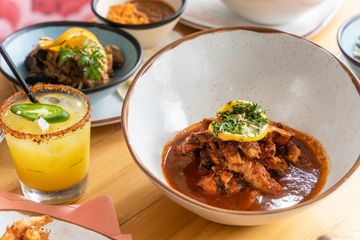Taste the authentic flavors of tacos that define Mexican cuisine
Is Mexican Food Healthy? Unpacking the Nutritional Perks of Typical Ingredients
The question of whether Mexican food is healthy and balanced invites an expedition of its typical components. Beans and corn function as fundamental staples, abundant in healthy protein and fiber. Avocados supply helpful fats, while different natural herbs and seasonings include flavor and health benefits - best mexican westchester NY. Together, these elements produce a tapestry of nourishment. The healthfulness of Mexican cuisine usually depends on preparation techniques and portion dimensions. What duty do these elements play in identifying its overall dietary value?
The Power of Beans: Healthy Protein and Fiber-Rich Staples
Although commonly overlooked, beans function as a foundation of Mexican cuisine, supplying a riches of nutritional benefits. Rich in healthy protein, they are an exceptional plant-based choice for those seeking to fulfill their dietary healthy protein requires. This high protein web content supports muscle mass repair and development, making beans invaluable for both vegetarians and meat-eaters alike. Furthermore, beans are a phenomenal resource of nutritional fiber, which helps in digestion and advertises a sensation of volume, potentially aiding with weight management.
The variety of beans made use of in Mexican recipes, such as black beans, pinto beans, and kidney beans, adds to a varied flavor profile and can improve meals nutritionally. Beans are low in fat and have vital vitamins and minerals, consisting of iron, magnesium, and folate. With each other, these features make beans a critical ingredient, supplying both nourishment and nutrition in typical Mexican fare.
Corn: a Versatile Grain With Nutritional Perks
Corn sticks out as a flexible grain fundamental to Mexican cuisine, celebrated not only for its culinary applications yet also for its remarkable dietary profile. As a main component in recipes like tortillas, tamales, and pozole, corn offers crucial nutrients that add to a well balanced diet plan. Rich in carbohydrates, it works as a substantial power source, while also being low in fat, making it a favorable option for numerous nutritional demands.
Corn is an excellent source of nutritional fiber, which helps in digestion and advertises satiety. It includes substantial quantities of vitamins such as B-complex vitamins, which are important for power metabolic process. The visibility of anti-oxidants, specifically carotenoids, adds to total health by lowering oxidative tension. In addition, corn is gluten-free, accommodating those with gluten sensitivities. Overall, the dietary benefits of corn emphasize its significance in typical Mexican food and its duty in a healthy and balanced diet plan.
Avocados: Healthy And Balanced Fats and Nutrients in Every Bite
Avocados play a significant role in Mexican food, complementing recipes with their velvety texture and rich taste. Beyond their cooking allure, avocados are celebrated for their outstanding dietary profile. They are an abundant resource of healthy monounsaturated fats, which can help lower bad cholesterol levels and assistance heart health and wellness. In addition, avocados are loaded with crucial minerals and vitamins, consisting of potassium, vitamin E, and B vitamins, contributing to general wellness.
The high fiber web content in avocados aids food digestion and promotes satiety, making them a beneficial addition to any dish. Their one-of-a-kind nutrient composition can also sustain skin wellness and provide anti-inflammatory benefits. Including avocados into traditional Mexican dishes or enjoying them as a standalone snack can boost both taste and nutrition, demonstrating why they are a precious staple in Mexican cuisine. Generally, avocados use a tasty method to appreciate healthy fats and essential nutrients in every bite.

Natural Herbs and spices: Flavorful Health And Wellness Boosters
While enjoying the rich flavors of Mexican cuisine, one can not neglect the necessary function that spices and natural herbs play in improving both taste and health. Active ingredients such as oregano, chili, and cilantro peppers not just add to the vibrant flavor profile yet additionally provide considerable wellness benefits. For instance, cilantro is understood for its cleansing residential or commercial properties, helping to eliminate hefty metals from the body, while taqueria jalisco oregano is loaded with antioxidants and possesses anti-inflammatory results.
Chili peppers, a staple in many Mexican dishes, include capsaicin, which has been connected to boosted metabolic process and discomfort alleviation. In addition, seasonings like cumin and coriander support digestion and may help in blood glucose policy. Incorporating these flavorful health and wellness boosters right into dishes not only boosts the culinary experience however additionally advertises total health, making Mexican cuisine not simply scrumptious, yet likewise nutritionally helpful.
Typical Cooking Methods: Enhancing Nutrition and Taste
Traditional food preparation methods in Mexican food play an important role in boosting both nutrition and taste, as they often focus on fresh ingredients and time-honored methods. Techniques such as nixtamalization, where corn is saturated and cooked in an alkaline option, not only enhance the nutrient account of tortillas but likewise enhance their digestibility - hand crafted margarita. Furthermore, using sluggish food preparation approaches, like stewing or braising, allows flavors to combine perfectly while preserving the stability of the active ingredients

Frequently Asked Questions
Are Mexican Food Portions Usually Larger Than Other Cuisines?
Mexican food parts are commonly larger than those of many other foods. This particular shows standard eating practices, stressing common sharing and hearty meals, which can lead to a more substantial serving size overall.
How Does the Prep Work Technique Affect Healthiness of Mexican Food?
Preparation approaches considerably affect the healthiness of Mexican food. Methods such as grilling or steaming protect nutrients, while frying can enhance unhealthy fat content. Options of ingredients and cooking styles eventually identify general nutritional worth.
Can Mexican Food Be Tailored for Particular Dietary Constraints?
Mexican food can without a doubt be tailored for certain dietary constraints. Substitutions, such as using corn tortillas for gluten-free diet plans or incorporating even more vegetables, enable people to delight in typical flavors while suiting numerous nutritional demands.
What Are Typical Mistaken Beliefs About Mexican Food and Health?
Typical misconceptions about Mexican food consist of the belief that it is inherently harmful, overly spicy, and entirely concentrated on fats. In fact, conventional dishes usually feature nutritious components and can be you can look here tailored to numerous dietary demands.
Are There Much Healthier Choices at Mexican Restaurants?
Healthier choices at Mexican dining establishments usually include barbequed meats, beans, and fresh vegetables. Picking meals that stress whole ingredients and avoiding hefty sauces can lead to an extra nourishing dining experience, advertising overall health.
The range of beans made use of in Mexican dishes, such as black beans, pinto beans, and kidney beans, contributes to a diverse flavor account and can boost dishes nutritionally. Avocados play a considerable function in Mexican cuisine, enhancing recipes with their luscious structure and rich flavor. Integrating avocados right into conventional Mexican meals or appreciating them as a standalone treat can enhance both flavor and nutrition, showing why they are a precious staple in Mexican food. While appreciating the rich flavors of Mexican cuisine, one can not neglect the necessary function that spices and natural herbs play in boosting both taste and health. Conventional cooking methods in Mexican food play an important role in enhancing both nourishment and taste, as they often focus on time-honored strategies and fresh active ingredients.